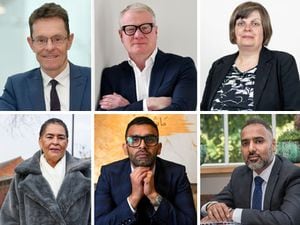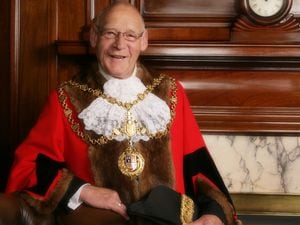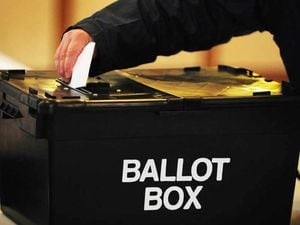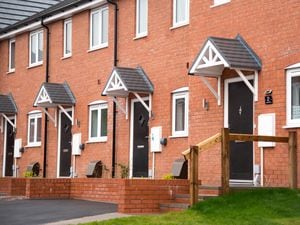PM hints at windfall tax as he brings Cabinet to Midlands
A windfall tax could be on its way to help people struggling with the cost of living, the Prime Minister has hinted as he brought his Cabinet to the Midlands.
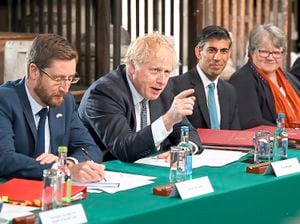
Boris Johnson used the visit to stress his commitment to those struggling to make ends meet.
And he hinted that he was prepared to tax energy companies and pass the money on to families.
The Prime Minister brought his entire Cabinet to Staffordshire for a meeting before heading to the West Midlands later in the day.
Downing Street stressed ahead of the meeting that it was “keeping options open” as pressure mounted for action against energy giants.
Oil, gas and electricity companies have raked in billions in extra profits as families struggle with massive rises in fuel prices. Shell, BP, Exxon Mobil and Chevron have all seen profits rise, boosted by high oil prices in the wake of Russia’s invasion of Ukraine. Between them, the four companies reported £22 billion in profits during the first three months of this year.
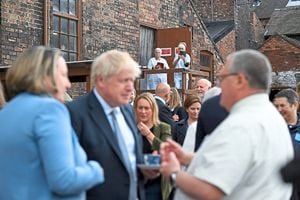
The PM refused to rule out a windfall tax, saying: “We’re going to make sure we use all our ingenuity, all our compassion, everything we need to do to help people through the difficult aftershocks of Covid, and the inflationary pressures that we’re seeing, particularly on the costs of energy.
“We’re going to have be very, very committed, very, very radical, very, very forward-thinking – but stick to the basics of our thinking about getting people into high wage, high-skilled jobs.
“Folks, we’re going to get through this, it’s going to take a lot of focus – but jobs, jobs, jobs is the answer – that is how we will unite and level up across the whole country, and get on with delivering on the mandate that the people gave us two-and-a-half years ago.”
Downing Street said that neither Mr Johnson nor Chancellor Rishi Sunak believe a windfall tax was the “right approach”, but that it had to “keep all options on the table”.
The journey north of senior politicians was part of a plan to show the public they are serious about the ‘levelling up agenda’.
And, Partygate apart, the current economic crisis dominated questions to the Prime Minister from the press and members of the public.
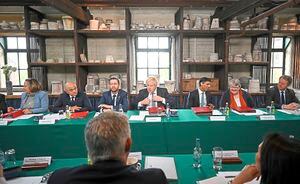
Chancellor Rishi Sunak has reportedly told Treasury officials to examine plans for a levy on the soaring profits of the oil and gas giants.
It follows an admission by BP chief executive Bernard Looney, who said his firm’s investment plans would not be affected by a windfall tax.
The Prime Minister, who visited Churchill China in Sandyford ahead of the cabinet meeting held at Middleport Pottery in Stoke-on-Trent, said that, while he still does not like such taxes because of the impact on investment, it is something that will have to be considered.
Pressed on Mr Looney’s comments, he said: “Well, you know, then we’ll have to look it.”
However, he added: “The disadvantage with those sorts of taxes is that they deter investment in the very things that they need to be investing in – new technology, in new energy supply.
“I don’t like them. I didn’t think they’re the right thing. I don’t think they’re the right way forward. I want those companies to make big, big investments.”
Mr Johnson urged Cabinet members to “bring the benefits of the Queen’s Speech to life” as they met for the awayday in Staffordshire.
Downing Street said ministers discussed how the new legislation will boost the economy, improve living standards and level up opportunities across the country.
Mr Johnson suggested that the Government will be coming forward with more assistance for hard-pressed families in July.
Downing Street was forced to deny that ministers are preparing an emergency budget to deal with the cost-of-living crisis after the Prime Minister suggested in the Queen’s Speech debate on Tuesday that there would be more help in the days to come.
However, Mr Johnson indicated there would be additional support over the summer rather than waiting for the Budget in the autumn to act.
“There is more coming down the track. July and so on,” he said.
“But what we will do is use all the ingenuity and compassion that we have and the fiscal firepower that we have as a result of the strong economic growth we had coming out of the pandemic.
“Our growth will return very strongly in the next couple of years.”
His comments follow the first meeting this week of the Government’s cost-of-living committee, where he instructed ministers to come forward with proposals to ease pressure on household budgets.
In a statement ahead of the Stoke-on-Trent Cabinet meeting, Downing Street said the Government “will continue examining what more we can do to ease the pressures on hard-working people and families” over the “coming months”.
Households face soaring energy bills, inflation is forecast to hit 10 per cent, and welfare payments and wages are falling far behind the increase in prices.

